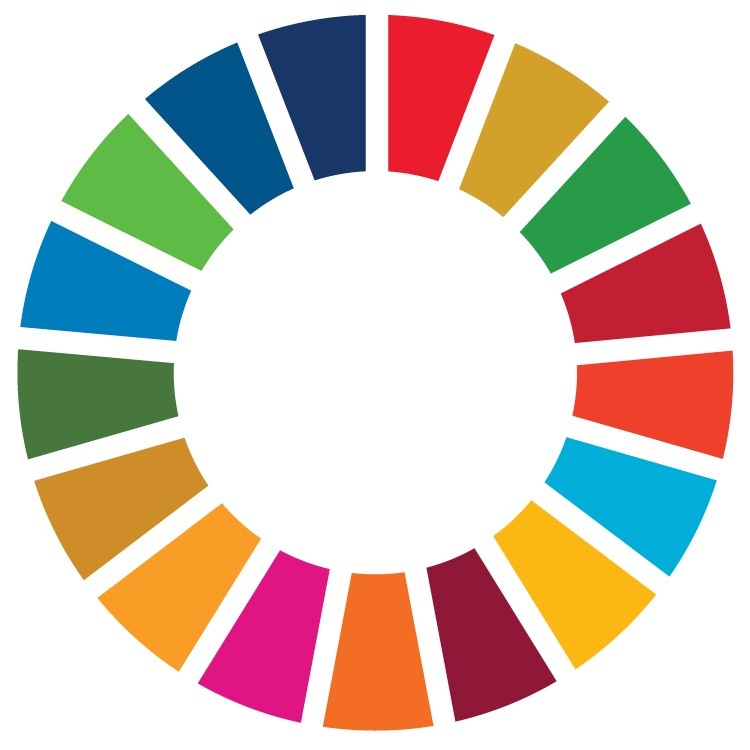Geopark Charters
Introduction
This is a case study of how 3 destinations were facilitated in creating a Destination Charter based on regenerative principles.
Using our Super Six of Better Tourism paradigm as a departure platform (i.e. the point from which conversations with stakeholders started) here are the Charters that emerged from three distinctive destinations that we have worked with.
All three destinations sought a Charter that would include tourism but also be about more than tourism. The starting mindset was about ensuring the visitor economy delivers a net positive benefit for communities, the environment, and the destination.
The interesting thing is how this shared mindset and The Super Six ‘translated’ into different language and expressions that hold true meaning and direct relevance to each individual place, and its heritage and its communities.
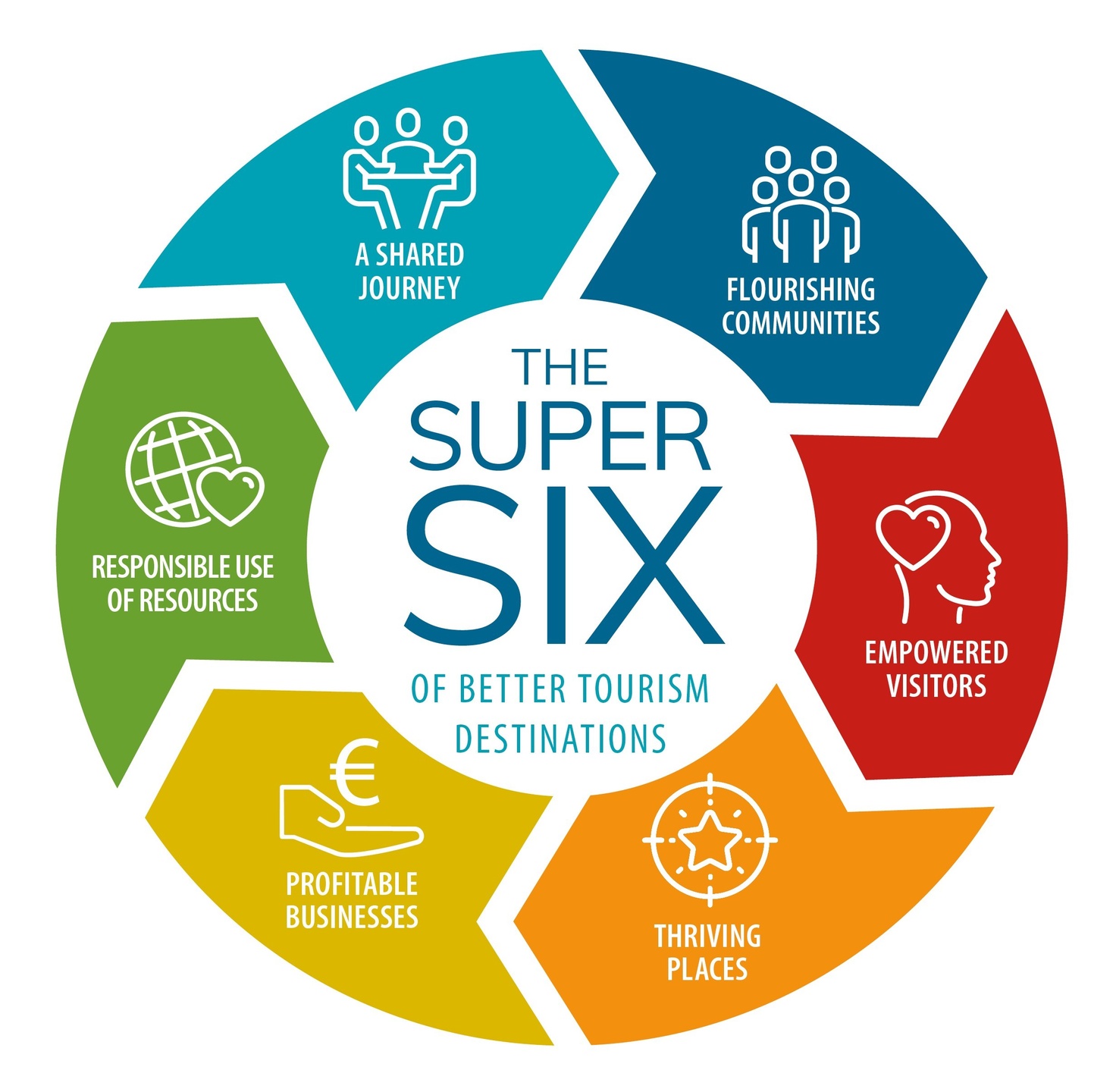
The Process
While the nature and duration of the process was different in each of these 3 destinations, ranging from 3 years to 3 months (!!), a number of key stages are common to all:
- A detailed briefing process.
- Analysis of secondary data on the history and development of the Geopark.
- Gathering of primary, qualitative data through consultations and conversations with the widest possible range of stakeholders.
- Convening of as many stakeholders as possible in a creative workshop environment to consider the framing of tourism in the place.
- A process of deep-listening, enquiry and teasing out and a commitment to holding a space and time for discussion and conversation.
- A period of reflection by all followed by a re-convening of stakeholders.
- A draft charter based on all previous stages that provided something concrete for collective tweaking and fine-tuning.
- Agreement on the final ‘Charter’ that represents the area and its communities and that provides a set of shared guiding principles adopted as a framework for future discussions, decision-making and action.
One Shared Mindset - Three Localised Charters
Burren & Cliffs of Moher UNESCO Global Geopark - Code of Practice
Already with a strong heritage in tourism and visitor experience development, this Geopark wanted to express what ‘sustainable tourism’ would mean for it and the businesses that operated within it. Having sought for some years to lead the adoption of sustainable practices through promoting national and international certification standards, the Geopark management team came to realise that these lacked sufficient meaning on a local level to inspire and sustain real engagement across a wide spectrum of businesses in the destination. This led the team to create a Geopark-specific Code of Practice based on the Geopark’s own mission statement and extensive local consultations. The Geopark Code of Practice for Sustainable Tourism was first adopted in 2014 and continues to be adopted and practiced by more than 70 businesses in the Geopark today.
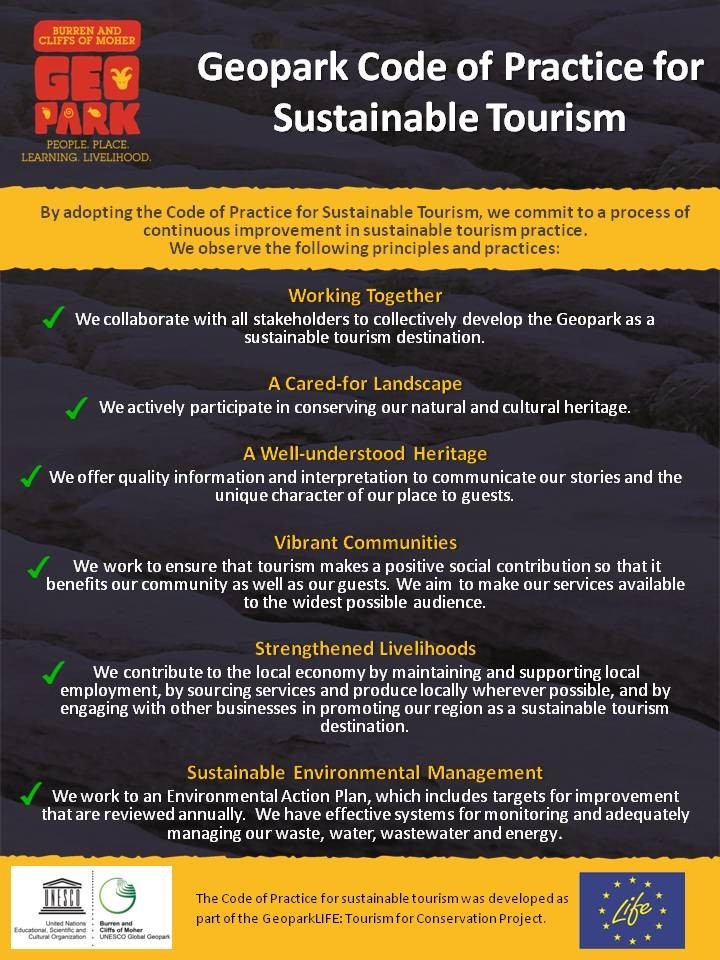
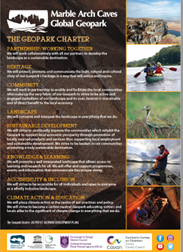
Marble Arch Caves UNESCO Global Geopark
“Our mission is to nurture and protect our place to ensure it provides a solid social, environmental and economic platform for its communities and enables them to live in balance. Our mission is to nurture and protect our unique heritage so that our place can restore and revitalise those that live and visit here, and can enable connections between people, heritage and nature.” Marble Arch Caves UNESCO Global Geopark (now Cuilcagh Lakelands Geopark)
With this mission statement as a guide, we were commissioned to prepare a 10 year development plan which would seek to provide for the social and economic needs of the local populations, to protect the landscape in which they live and to conserve their cultural identity. To facilitate this, a principle-driven Geopark Charter was created through extensive discussion, reflection and an iterative process. The Charter that eventually emerged defined the principles that would guide decisions and actions across the 6 Strategic Pillars of the Geopark’s Development Plan (Cross-Border Governance, Stakeholder Engagement, Education, Tourism, Community and Conservation & Recreation). It also defined what those principles would mean in this particular Geopark, the world’s first cross-border Geopark.
Excuse the poor quality image. The principles are:
- Partnership/Working TogetherHeritage
- Community
- Landscape
- Sustainable Development
- Knowledge and Learning
- Accessibility and Inclusion
- Climate Action and Education
Joyce Country & Western Lakes Geopark Project
This is an emerging destination, being framed for the first time within the context of an application for UNESCO Global Geopark status. Its challenge and opportunity was to create a framework to express the personality of this ‘new’ place and what the project itself would stand for. The desire was for a ‘charter’ or ‘manifesto’ that would put expression on the ambitions of the management team for the project. Another objective was that the charter would allow local community, businesses and public stakeholders readily understand what the project was about, and help them decide if they would like to be part of it or not. The proposed Geopark area is bi-lingual and includes one of the few remaining areas in Ireland where the ancient Irish language is the everyday language of communication. Hence, the use of Irish words, each carrying thousands of years of learned wisdom, to headline the principles of their place.
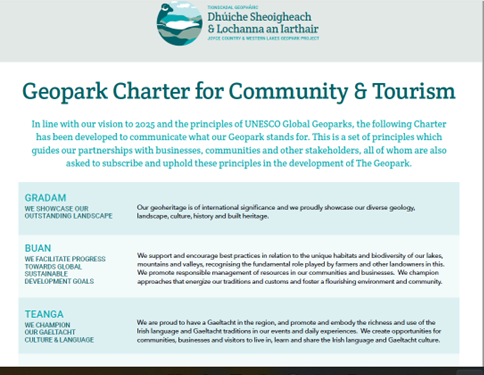
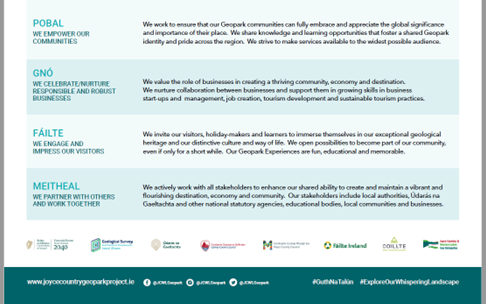
Contact us today to see how we can help you create a Destination Charter in your area.
Contact UsMAKING A DIFFERENCE
As part of our sustainability policy, The Tourism Space™, has committed to raising awareness of how tourism can positively contribute to the global sustainability agenda. We have extensive experience, from both a research and practice perspective, in supporting the emergence of sustainable approaches within businesses and destinations. We integrate the Sustainable Development Goals into our programme design and delivery, thereby building awareness and understanding and highlighting how each business and destination can contribute in practical and meaningful ways.
Read more about how we support sustainability and regeneration